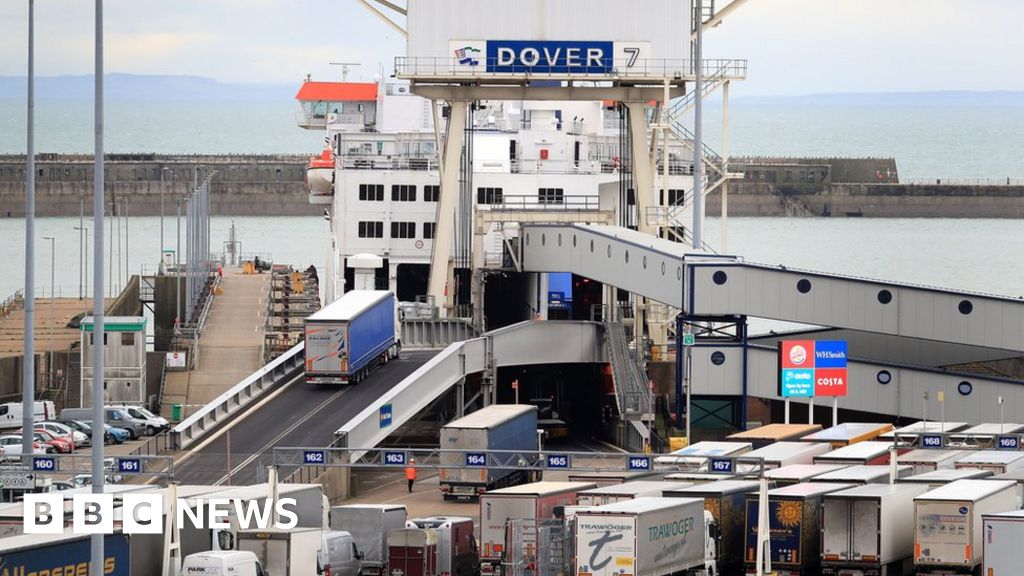Ferry companies warn of gridlock in no-deal Brexit - 5 minutes read
 Ferry companies warn of gridlock in no-deal Brexit
Ferry companies warn of gridlock in no-deal BrexitCross-channel ferry companies have warned of gridlock around British ports, as they confirm they will not allow trucks to board ferries bound for France after a no-deal Brexit, unless they have the right paperwork.
"We cannot take lorries across that cannot enter the country," one ferry company told BBC Newsnight.
Many UK exporters are yet to obtain the proper documentation.
The Department for Transport said plans were in place to manage disruption.
Newsnight has spoken to sources at the main freight ferry companies operating in the channel.
"If a truck doesn't have the right document we cannot board him. We cannot take lorries across that cannot enter the country," said Gert Jakobson, a spokesman for DFDS, which transports 1.2 million trucks between Dover and Calais and Dunkirk each year.
That was corroborated by a source at a different ferry company, which did not want to comment publicly.
"There's no point in boarding vehicles, because at the other end our French colleagues have told us we won't be allowed to proceed," the source said.
Both companies said the result of this procedure, given many trucks are expected to turn up without the right documentation, was likely to be tailbacks of trucks on the UK side of the channel.
"For a period of time, for a few weeks and months, we assume the problems will be bigger. There will be more who are not yet accustomed to the paperwork. There will be a learning curve and then we believe it will work much better," said Mr Jakobsen.
"If you have a constant stream of lorries that don't have the right documentation and it may take anything from 24-48 hours to get that documentation, potentially you've got a whole bundle of trucks and nowhere for them to go," said the other source.
Jean Marc Puissessau, the president and chief executive of Port Boulogne Calais, also told Newsnight that the French side expects ferry companies to deny boarding in the UK to trucks without the right paperwork.
"If hauliers don't have documents they won't be allowed to board. This was the rule on 29 March. Those same rules will apply on 31 October," he said.
A spokesperson for the Department for Transport said: "There are well-developed plans in place to manage any traffic disruption in Kent in the event of a no deal scenario, keeping the M20 open with traffic continuing to flow in both directions.
"The government remains focused on ensuring the UK's smooth and orderly withdrawal from the EU."
Both French and UK port officials have previously sought to downplay concerns about traffic chaos in the wake of a no-deal Brexit.
In June, the Dover Harbour Board CEO Doug Bannister said "the Port of Dover, as with our sister ports in France and our ferry partners, are prepared for the 31st of October."
And his Calais counterpart Mr Puissesseau, had pointed to the construction of new customs facilities and vehicle holding pens at the French port, saying "there will be no delay" on the French side.
But research by Imperial College London, commissioned by the BBC, suggested just two minutes of extra check times at UK borders could result in queues extending up to 30 miles from Dover into Kent.
And Newsnight revealed that as of June 2019, two thirds of the relevant UK firms had still not applied for an Economic Operator Registration and Identification (EORI) number, which they would need to trade with the EU after a no-deal Brexit.
Earlier this week, Chancellor Philip Hammond raised concerns that France could effectively push problems to the UK side of the channel.
"Many of the levers are held by others — the EU 27 or private business. We can seek to persuade them but we can't control it. For example, we can make sure that goods flow inwards through the port of Dover without any friction but we can't control the outward flow into the port of Calais," the chancellor told Panorama.
Each day, around 10,000 lorries pass through the port of Dover, which handles 17% of the UK's goods trade, worth more than £120bn.
You can watch Newsnight on BBC Two weekdays at 22:30 or on iPlayer, subscribe to the programme on YouTube and follow it on Twitter.
Source: BBC News
Powered by NewsAPI.org
Keywords:
Ferry • Gridlock • Brexit • English Channel • Ferry • Gridlock • United Kingdom • Ferry • France • Brexit • Truck • Ferry • Newsnight • Department for Transport • Cargo • Ferry • Truck • Truck • DFDS • Dover • Calais • Dunkirk • Ferry • France • Gidsken Jakobsen • Boulogne-sur-Mer • Calais • Newsnight • France • Ferry • Law • Law • Department for Transport • Kent • M20 motorway • United Kingdom • France • United Kingdom • Brexit • Port of Dover • Port of Dover • Port • France • Ferry • Calais • Construction • French language • French language • Imperial College London • BBC • Dover • Kent • Newsnight • Eori • European Union • Brexit • Lord Chancellor • Philip Hammond • France • United Kingdom • European Union • Port of Dover • Port of Calais • Port of Dover • United Kingdom • Newsnight • BBC Two • BBC iPlayer • YouTube • Twitter •